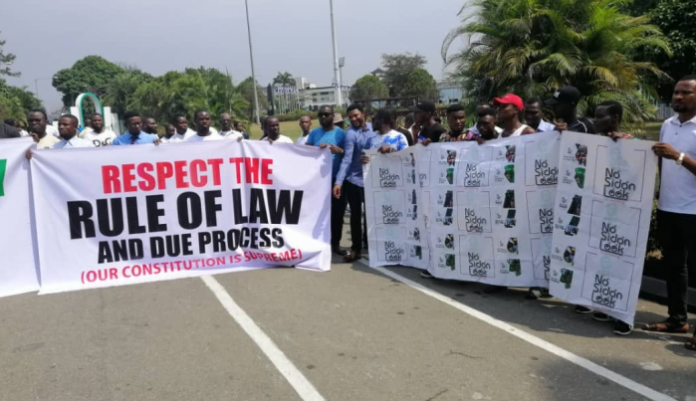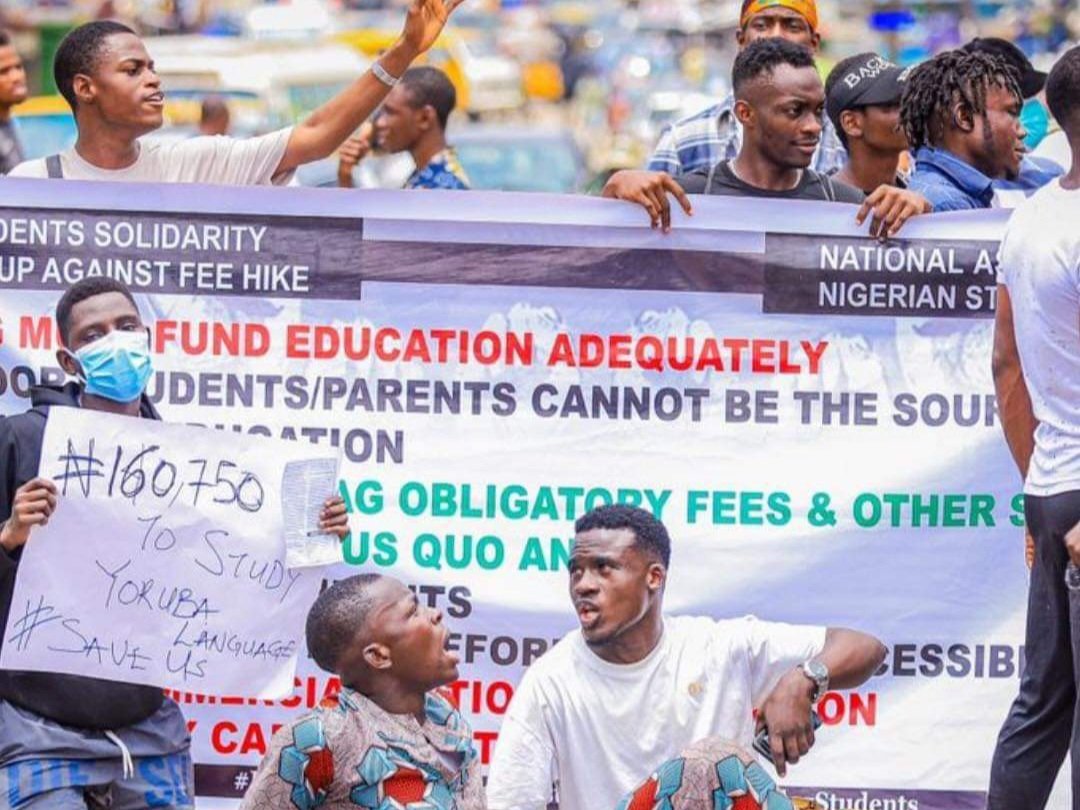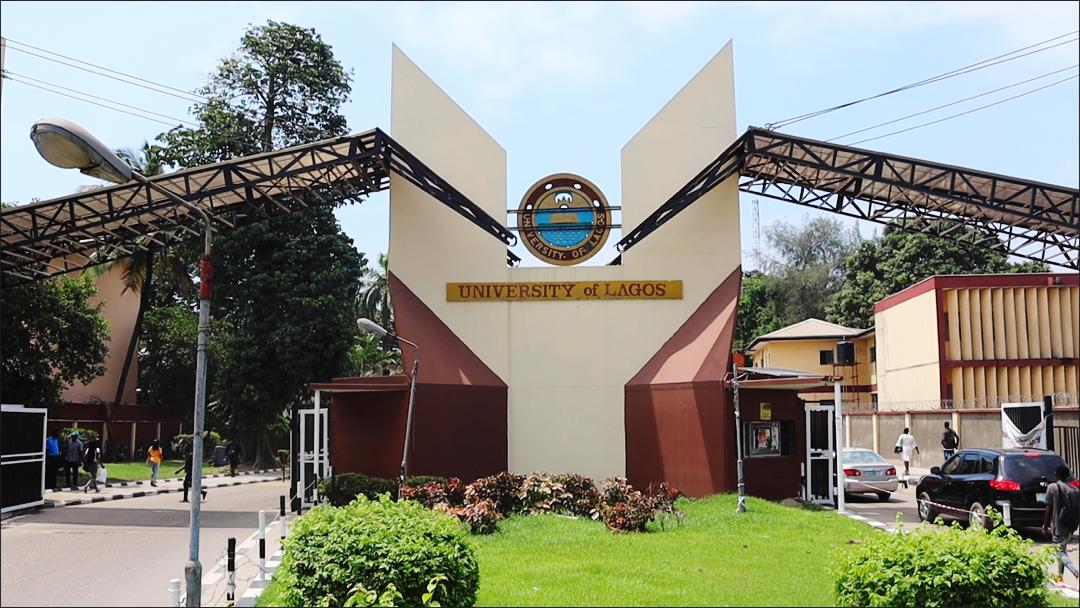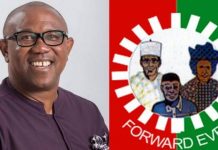Iyawo Ajewole, 14 February 2019.
On 25 January 2019, President Muhammadu Buhari suspended the Chief Justice of Nigeria, Walter Onnoghen from office, and immediately swore in the most senior Supreme Court Justice, Justice Ibrahim Muhammed, as the Acting Chief Justice of Nigeria. According to President Muhammodu Buhari, the act was his way of executing an order ‘ex-parte’ of the Code of Conduct Tribunal, which was granted on 23 January 2019.
The president explained that this became necessary as a result of corruption-related charges that were levied at the Code of Conduct Tribunal against the CJN by the Code of Conduct Bureau. The CJN was said to have grossly violated the provisions of the Code of Conduct for public officers, as stipulated in the Constitution of Nigeria. When confronted with the charges, the CJN had earlier stated in writing that he ‘forgot’ to declare some of his assets to the CCB. Alas, these ‘forgotten assets’ ran into more than a billion naira in various bank accounts, as well as some 55 houses!
Strangely, it took only seven days for the petition received by the CCB against the CJN to be treated and charges filed against him, in readiness for his subsequent arraignment; this, in a country notorious for its slow legal processes. The next strange thing was the publicised demand of the Federal Executive for the resignation of the CJN from office, and the claim by the presidency that PMB was not aware of the CJN’s actions before he was charged. Furthermore, instead of the CJN’s resignation, as demanded by the presidency, Nigerians were treated to the ‘wonderful’ sight of a team of about 40 SANs (Senior Advocates of Nigeria) who came out to stand for him, obtaining a number of orders from the courts in order to frustrate his trial. It was on account of this that the FEC sought and got an order from the CCT to suspend the CJN from office. Finally, following that act, the president delivered a public address, almost like one given after a coup, in which he explained the reasons behind his actions.
Divided public opinion
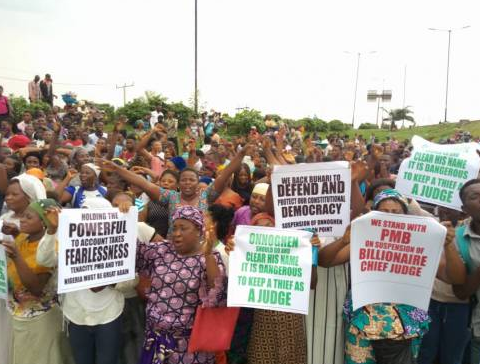
The suspension of the CJN has continued to generate a lot of debate. Arguably no other issue in recent times has elicited so much division in public opinion. Many people believe that the president acted illegally and unconstitutionally. They are of the opinion that the Nigerian Constitution guarantees security of tenure for judicial officers, especially the CJN, and that was why PMB could make no reference to the constitution in his public address to support his action. This school of public opinion maintained that a CJN cannot be suspended or removed from office without the recommendation of the Nigerian Judicial Commission and two-thirds concurring approval of the Senate. They equally posited that PMB’s declaration that the CJN constituted an obstacle to his anti-corruption fight was all nonsense and a disguised tyrannical and fascistic shift. This group constitutes the so-called ‘patriots, lovers of democracy, believers in the rule of law and abhorrence of corrupt practices in our public life’. A sizeable number of this group also believe that the anti-corruption campaign of PMB is selective and the ousting of the CJN a planned electoral manoeuvre.
On the other hand, an equally large section of the public lauded the PMB’s action, maintaining that it is based on a valid and subsisting order of the CCT, which has not been set aside, and which is incumbent on the president to enforce. This segment of public opinion posited that the actions of the president are perfectly apt as they address the substance of the allegation of corruption against the CJN. They believe that corruption must be fought by any means necessary without minding whose toes are trodden on, and anyone trying to frustrate this by means of legal technicalities/procedures, flagging up ‘due process’ or ‘rule of law’, should be dealt with accordingly.
The most interesting thing about the division of opinion is that almost no group of Nigerians are spared: from the ruling party ‘APC hailers’ to the main opposition party ‘PDP wailers’, from liberal democrats to self-acclaimed ‘Marxists’. People found themselves on either side of this divide.
The ruse of the rule of law
Marxism reveals that, as long as society is divided into classes, the ‘Law’, the ‘Rule of Law’, ‘Separation of Powers’, ‘Equality Before The Law’ and other bourgeois judicial concepts are nothing but sterile and deceptive ideas. In reality, the judiciary represents one of the most important instruments with which the capitalist state repress the working class in particular and the masses in general. The law is actually employed to protect the interests of the ruling class. Rather than being the last line of defence for the common man, the judiciary, along with other state apparatuses like the police and the army, only serves to maintain the status quo. The ruling class only talks about the rule of law when it serves them and is quick to jettison it when the destiny of the common man hangs in the balance. Their ‘Rule of Law’ is based on a colossal double standard.
In 2016, Otodo-Gbame, a waterside community inhabited by the poor, was razed by the Lagos State Government in alliance with Elegushi Royal Family. This was done despite a subsisting court order restraining the state government from proceeding with their planned demolition, pending determination of the suit filed by the occupants of the community. People were killed, many injured and hundreds rendered homeless, and nothing was said about the ‘rule of law’. The Lagos state government contravened the ruling of the court with impunity, and no hue and cry was raised by the elite. No team of SANs stood up in their defence. This is just one of the many examples in which ‘rule of law’ is brandished when a ‘Big Man’ is involved, while a criminal silence is maintained when ‘Little Men’ are at the receiving end.
The real story behind the power play
It is pertinent to shine a searchlight on the CJN’s suspension and the power play lying behind it. The removal of CJN Onnoghen is actually a reflection of a momentous division among the ruling class arising from differences of opinion on how to move forward in a crisis-ridden capitalist society. What is unfolding before us is a case of a regime fighting for its life; like all regimes in their dying days. The illusion of integrity of the deceitful APC-Buhari administration is daily being shattered. The regime has lost a significant segment of its support-base locally, and also from its imperialist friends in America and Europe. It is becoming harder by the day for the regime’s supporters to defend its utter ineptitude. Like others before it, the regime will not go down without a fight; without violating the so-called ‘Rule of Law’. This is what is playing out.
This is evident in the APC-Buhari’s double standard on fighting corruption. It is also evident in the fact that the regime is using the Onnoghen case to strengthen its position in the forthcoming elections. Moreover, what Buhari has shown by his action, like Jonathan (who also suspended the President of the Court of Appeal) and Obasanjo (who impeached a governor with four parliamentarians and once got a court order to declare a general strike illegal), is the hypocrisy of the ruling class when it comes to the ‘Rule of Law’.
The masses are watching all these antics and drawing their own conclusions. However, genuine activists and Marxists should not take the excuse of these two factors – double standards and electoral manoeuvres – as the basis for remaining silent on the call for trial and prosecution of CJN Onnoghen. To do so is to betray the cause of revolution, and to land oneself in the camp of reaction, in which PDP occupies a vantage point.
Beyond the divided public opinion, some segments even took the defence of the embattled CJN to a critical height by calling for boycotts and strikes to drive home their position. However, we know that bodies like the NBA, and the so-called Senior Advocates of Nigeria, are really disconnected from the plight and everyday sufferings of the masses, and only call for protests to protect one of their own.
The role of genuine Marxists
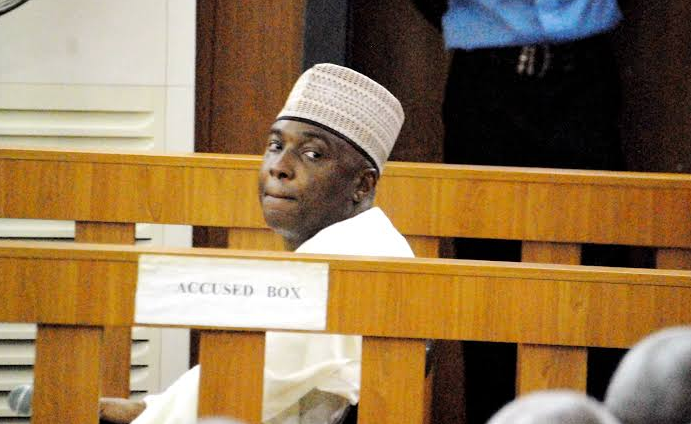
Our role, as genuine change seekers and Marxists, is to use every opportunity to expose how rotten the rule of capital has become, especially in a backward, neo-colonial state like ours; how the so-called last hope of the common man, the judiciary, in a class society is not only illusory but also a deception. The current battle is an intra-class one between one wing of the ruling class and another, with one wing enjoying the privilege of commanding the state power and state apparatus. Therefore, instead of dissipating energy on proving the legality or illegality of PMB’s actions, our task is to seize the opportunity of the division in the ruling class to enlighten the masses on the deception called the ‘Rule of Law’ and to channel our interventions in a way that would deepen their differences and not to help them solve their crisis. Any attempt to understand or explain the situation through legal provisions or bourgeois morality will only place us behind one or the other section of the ruling class. Constitutional considerations and moral standards are nothing to the bourgeoisie once their interests are at stake.
Our approach should be to show the oppressed layers in the society that, contrary to attempts to paint judges as incorruptible, the revelation and admission of CJN Onnoghen to owning multimillion naira worth accounts is a confirmation of the fact that, when it comes to corruption, the judiciary is no different to the legislative and executive branches of the state. All the arms of government are rotten inside and out. The fact that the PMB-led executive arm is not really acting in the interests of the poor masses or the working class should be exposed. The regime is definitely using this development to further its interests, especially concerning the 2019 elections. When it comes to Buhari and Onnoghen’s respective manoeuvres on the basis of ‘due process’, we must not be seen (or even perceived as) supporting either of the two sides of our class enemies.
The way forward for the Nigerian masses

It is to their great shame that many of our liberal democrat ‘friends’, and even some ‘Marxists’ continue to reinforce the masses’ illusions in the so-called rule of law and bourgeois democracy. They encourage the masses to lean on one section of the ruling elite to attack another section. This is criminal. This regime, together with its conjoined twin, the PDP, is our class enemy and so we will not take sides with one or the other. We will not fight their battles for them. The working class will march behind its own independent banner, and together with other oppressed layers, emancipate society from the evil clutches of the blind and brainless ruining elite.
These ‘activists’ shout themselves hoarse when trying to ‘protect’ democracy and the rule of law but are mute when it comes to attacks on the poor, justifying these in some cases. The masses would have fared much better if these activists expended just a quarter of the energy they are dissipating on Onnoghen, on issues like the non-payment of salaries and pensions, the criminal imposition of huge school fees, especially in higher institutions: federal and state-owned universities, polytechnics and so on.
The masses must know when to move; when to fight their own battles. What the Onnoghen palaver portends is that the Nigerian revolution will be soon upon us. The working-class and other poor layers must also hasten their preparations for it.
It is only when the working class organises itself into a formidable force that it will be able to wrest power from these clueless elements, and we can truly have peace. What happened a few weeks ago, when the working class took action against the Buhari-APC regime through their own organisations – NLC, TUC, ULC – is an indication of the mammoth potential of its power. From Zamfara to Lagos, from Benue to Owerri, from Calabar to Taraba, they marched, united across the lines religion and ethnicity, to demand what was rightfully theirs: increased wages. They would do much more against whoever emerges victorious in the February and March 2019 presidential and governorship elections.


